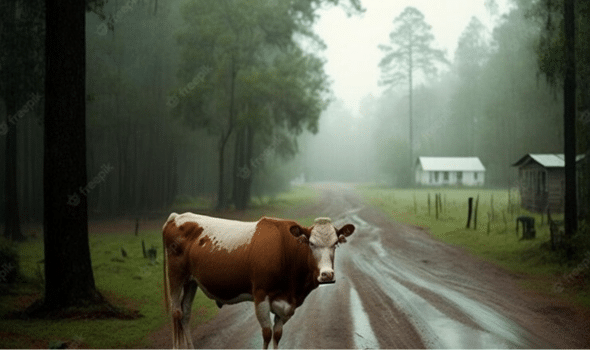
Animal Healthcare
Care of Cattle Animals During Monsoon
Monsoons serve as a joyous time for most people. But, the seasonal changes that monsoon brings with it, such as heavy rainfall and unpredictable climatic conditions can also negatively affect the conditions of the beings within our ecosystem. One such group that is significantly affected in numerous facets is the livestock industry, mainly the cattle animals. Rains are said to impact cattle both physically and physiologically. Furthermore, it is also observed that gastrointestinal illnesses and respiratory issues become a common occurrence among cattle in the monsoon season.
Through this blog, let us understand the multifaceted impact of monsoons and the measures of care that livestock farmers should adopt to safeguard the overall health to ensure the productivity of their animals.
Below mentioned are a few challenges that cattles face during the monsoon season:
Higher risk of diseases:
The wet and moist conditions give rise to several health issues and diseases such as skin and fungal infections. Also, the increase in humidity and damp conditions are a perfect breeding ground for harmful microorganisms, parasites and mosquitoes, which can lead to severe health risks.
Water contamination:
There is a high risk of water sources coming in contact with harmful contaminants such as farm chemicals, dyes, fertilisers and pesticides in the farms. Pollutants in drinking water are a severe health risk, and affect the overall health and growth of the cattle.
Decrease in milk production:
The fatigue and the stress due to change in temperature along with other challenges of the season such as decreased feed intake results in reduced milk production.
Waterlogging:
Waterlogging is a common occurrence in most farm premises during monsoons. Broken sheds with no or little light and ventilation combined with an increase in cold and humid periods lead to the aforementioned problem.
Mentioned below are a few practices that farmers should adopt to provide optimum care to their cattle animals during monsoon.
Proper housing:
Leakage of water through the shelters of the animal’s housing is a huge problem that should be averted by cattle rearers during the monsoons. Cattle premises should be adequately spaced, dry and ell ventilatedith clean air. It is suggested that the shelters are placed at an elevated position as it prevents the chances of waterlogging which can lead to emergence of waterborne diseases.
Healthy feed and water supply:
The availability and the quality of grass Is one of the vital elements in the diet of cattle. But, the process of grazing is hampered with the arrival of monsoon. Hence, in monsoons, cattle diet can be supplemented with additional nutrients to help the cattle maintain a balanced diet which is key for their well-being and productivity. Consistent supply of clean, adequate and fresh drinking water is of utmost importance as there is a possibility of contamination from rainwater or Other contaminants
Periodic health monitoring:
An integral practice that should be performed regularly to keep in check the health of the cattle and the herd. The blood pressure, temperature levels and many facets of the cattles health should be carefully monitored and evaluated. This is because they are susceptible to extreme stress, fatigue and sometimes illnesses during the monsoon period. Furthermore, necessary vaccination and veterinary care protocols should also be put in place as they ensure optimum health of the cattle.
Safe animal feed storage:
Excessive moisture during monsoon promotes the growth of moulds in the feed. Mouldy feeds are harmful to the health of the cattle if consumed. Hence, cattle rearers should ensure a safe, dry and hygienic way of the storage of animal feed especially during monsoons.
Disease preventive measures:
Adhering to these practices during monsoons can help in the protection of the animals’ health and ensure productivity and prosperity for the cattle farmers. It is important to seek medical advice from veterinary professionals if the health of the animal doesn’t improve in time.







Add your comment